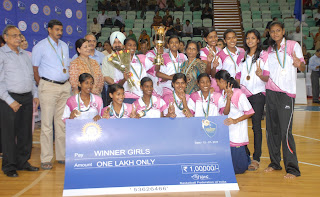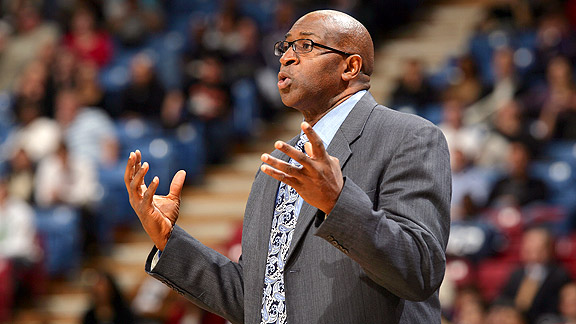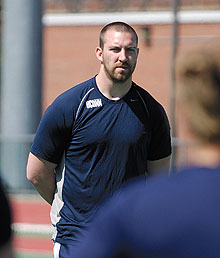The best way to solve Basketball Federation of India’s power struggle? A game of basketball, of course!
This article was first published in my column for Ekalavyas on April 9, 2015. Click here to read the original post.
The stage was set for a showdown when two opposing factions of the Basketball Federation of India (BFI) called two separate Annual General Meetings (AGM) in two different cities on two different days. The purpose of both these meetings was to select a new executive committee – including a new BFI president – for the federation that governs all things India Basketball. And that is exactly what happened. In Bangalore on March 27, in a meeting led by former president KS Gill, the Karnataka State Basketball Association’s secretary K Govindraj was elected president; in Pune on March 28, in a meeting organized by BFI CEO Roopam Sharma, the chosen president was Poonam Mahajan.
 |
| Ms Poonam Mahajan (left) and Mr Govindraj are the two nominated Presidents in each of the rival factions. Photo Courtesy: Ekalavyas |
The stage was set for a showdown when two opposing factions of the Basketball Federation of India (BFI) called two separate Annual General Meetings (AGM) in two different cities on two different days. The purpose of both these meetings was to select a new executive committee – including a new BFI president – for the federation that governs all things India Basketball. And that is exactly what happened. In Bangalore on March 27, in a meeting led by former president KS Gill, the Karnataka State Basketball Association’s secretary K Govindraj was elected president; in Pune on March 28, in a meeting organized by BFI CEO Roopam Sharma, the chosen president was Poonam Mahajan.
Two meetings. Two presidents. Two executive committees. One federation. With neither side willing to back down, it has become clear that the Indian Olympic Association (IOA) will have to step in to resolve the issue. A legal battle in court might be the next chapter in this ugly drama.
But what if the problem was resolved on a different kind of court? After all, ‘Team Roopam’ and ‘Team Govindraj’ are each fighting for the throne to lead Indian basketball. Somewhere along this political fight, basketball itself seems to have been ignored. Maybe the best way to solve the Basketball Federation of India’s power struggle is just a game of basketball.
Introducing… The Basketball Game for Basketball, where the competing factions of the BFI play step out on the basketball court for one 40 minute contest to decide it all.
This is a (mostly) a work of fiction.
Setting
Three years ago, the BFI dedicated the Mastan YMCA basketball courts in Mumbai to the memory of former Secretary-General and CEO Harish Sharma. Sharma was the leader of the BFI and the CEO position had been created specifically to keep him in a position of power. Other positions like Secretary-General, President, Treasurer, and the rest of the Executive Committee have to be elected on the basis of a vote at the AGM. There is a time limit of how many years any one individual can keep hold of a senior committee position. After Sharma’s death in 2012, his wife Roopam Sharma was made CEO (instead of the position being abolished) and the divide within the BFI grew wider: some supported her, others didn’t. Of course, this means that he newly named Harish Sharma Basketball Courts in Mastan, Mumbai should play host to The Basketball Game for Basketball.
Team Govindraj
Starting 5: K Govindraj (President), Teja Singh Dhaliwal (Senior Vice-President), RS Gill (former President), Chander Mukhi Sharma (Secretary-General), V Raghothaman (Tresurer).
Bench: Ajay Sud, D.R. Saini, Shafiq Shaikh, Bhupendra Shahi, L. Suren (Vice-Presidents), Shakthi Singh Gohil (Associate Secretary), Norman Isaac (Executive Committee Member).
Team Roopam
Starting 5: Poonam Mahajan (President), Roopam Sharma (Secretary-General), Mukut Medhi (Treasurer), RS Chahal (Senior Vice President), Prempal Singh (Associate Secretary).
Bench: Nandini Bassapa, Ashok Kumar Sahu, Rajesh Patel, Ajeet Singh Rathore, Dalbir Singh Kharab, Vinod Vachani (Vice Presidents), Ashok Rangeen (Associate Secretary).
First off, Team Roopam must be praised for diversifying the gender field and featuring two women in the starting lineup (Mahajan and Sharma) and one off the bench (Bassapa). They also have youth on their side, kind of: 34-year-old Mahajan is the youngest president of any Indian sports federation. Both teams have some great Indian coaches and former players but Team Govindraj may be a little more athletic (I’m using the word ‘athletic’ in its broadest definition possible).
Team Roopam may have some home court advantage, specifically because of Mahajan’s Mumbai connection (she is the BJP national secretary and MP from the Mumbai North-Central Lok Sabha constituency) and because of the Maharashtra State Basketball Association (MSBA) support that Mahajan brings as the first women president of the MSBA. Mahajan has a lot of political clout and had a powerful father Pramod Mahajan, whose one-time aide was none other than the late Harish Sharma, Roopam’s husband. By extension, the overall political advantage goes to the president-secretary general combination of Mahajan and Roopam Sharma.
Team Govindraj may have the legal advantage, however. As per BFI’s constitution and the India’s Ministry of Sports code, only the president of a federation can call an AGM, and thus, the meeting in Bengaluru – held under the guidance of departing president RS Gill – was technically the only ‘legal’ one. Team Govindraj also scored a major win when FIBA – the international body that runs basketball around the world – recognised them as the rightful office-bearers of the BFI.
Tip-off!
Usually, the illustrious names that have been mentioned above do their best at every major Indian sports event to find the most comfortable sofa seats courtside, sip in the finest local chai, and make sure that there is an extra timeout called in every top game so that they can be introduced midcourt to the diligently lined-up players. But this time, it will be the VIPs taking the court while our top players sit on the bleachers and watch. Unhappily.
With more aggressive intent to their side, Team Roopam try to control the pace of the game, running and gunning from the get go and trying to put as many points on the board early in the first quarter. There are a lot of turnovers, bad passes, and individuals attempting to play one-on-one hero-ball, but due to the sheer number of their attempts and their opposition’s slow start, Team Roopam are able to take a double digit early lead.
But as the game moves along, Team Govindraj grind the pace down to their comfort level and defend hard in the post. The game takes an even uglier twist as neither side is able to make their field goals anymore. There are a lot of stoppages, and with the help of the free-throw line, Team Govindraj crawl back to tie the game by halftime.
‘Fans’
The score-keepers seated on the side are representatives from the Indian Olympics Association (IOA) and judges from the Delhi High Court. Despite their best efforts, they have a difficult time keeping track of the awry field goal percentages from both sides.
Meanwhile, representatives from IMG Worldwide and Reliance Industries – the partnership of the two powerful companies that brought sponsorship rights to the BFI five years ago –watch and judge the game from the sidelines, scouting for the finest prospects to work with to help develop the game in India in the future. IMG-Reliance have been hoping to help the BFI launch India’s first professional basketball league, a process that seems to have been suspended consistently over the past few years. Other sponsors are present too, watching the tamasha, as are representatives from the NBA and NBA India, who have vested interest in the long-term development of the sport after these intriguing Federation Games.
The camera pans from the sponsors and CEOs to the other end, where India’s best players and coaches – the individuals who should actually be the stars of the Indian basketball story – are seated. About 10 months ago, Coach Scott Flemming and his team’s top players like Amrit Pal Singh, Amjyot Singh, Vishesh Bhriguvanshi, and more helped India get a historic first win over China at the FIBA Asia Cup. Two years ago, India’s Women’s team – represented here by Coach Francisco Garcia, legendary player Geethu Anna Jose, Anitha Paul Durai, Jeena PS and others – helped India finish at their best-ever fifth place at the FIBA Asia Championship for Women. Jose was even conferred an Arjuna Award this year.
(None of these accolades are mentioned of course because Indian basketball achievements weren’t the top priority at this basketball game).
Hundreds of more children, all of whom are basketball enthusiasts hoping to become stars for India and abroad, sit terror-stricken on bleachers around the stadium. Many concerned coaches reach over to them and cover their eyes to save them from the horrors ahead.
Second Half
Both teams start the second half with their more experienced players. For Team Roopam, coaches like Chhattisgarh’s Rajesh Patel, India’s junior coach Vinod Vachani, and Delhi’s Ashok Rangeen pit their collective strategies together to get some easy baskets for their team. For Team Govindraj, president Govindraj himself shows some moves from his playing days for Karnataka, while L. Suren rises off the bench to provide some defensive stops. Unfortunately, Team Roopam’s marquee player – president Poonam Mahajan – is confounded by the game that she is supposed to be presiding.
As the audience is subjected to a fourth quarter that no one wishes to watch, the game turns contentious, with the referees’ whistles threatening to steal the spotlight. An outlandish number of calls start going Team Roopam’s way, who opponents complain are winning the advantage due to political threats and blackmail. Team Roopam are unable to take advantage of the opportunity, however. The FIBA Commissioners presiding over this game – who have recently recognized Team Govindraj as the rightful office-bearers of the BFI – neutralize the refereeing scandal with imbalanced overseeing from their end.
By the final whistle, neither team has put up a particularly impressive score, all the players on court have picked up flagrant and technical fouls, and none of the fans are having a good time.
Final Whistle
Nobody is sure who won the game, but everyone knows that basketball lost.





%2Bdrives%2Bagainst%2B7%2Bfooter%2BAkashdeep%2BHazra%2Bof%2BIndian%2BRailways.JPG)





























